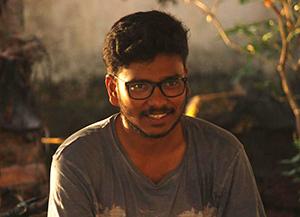'When the mill strike started, there was crisis in every mill worker household.'
'One entire generation went without education.'
'Hunger forced them to take to crime.'

Mumbai was once the hub of textile mills. Then came the great mill strike of 1982 which sounded the death knell of the mills who went out of business.
Over the years the mills were converted into malls; skyscrapers replaced chawls, the city forgot the mill workers who lost their jobs and were forcibly displaced.
Many authors have written heart-breaking stories of these mill workers. Among them, the late Jayant Pawar wrote Adhantar, a Marathi play that was adapted by Mahesh Manjrekar into a film, Lalbaug Parel.
A generation once worked in those mills; two generations later, their progeny work as the house-keeping staff in the malls and skyscrapers that have been built on mill land.
That is the theme of the musical Todi Mill Fantasy, the critically acclaimed and popular play which will be staged during this month's National School of Drama festival.
Todi Mill Fantasy looks at the lives of the mill worker community and the million possibilities they have 'to rise from the ashes of Phoenix (the erstwhile mill which is a sprawling mall today) and fly like a peacock'.
Most of the cast has been drawn from Girangaon, as the mill areas were popularly known, in Mumbai.
Director Vinayak Kolwankar grew up in Girangaon too and had not observed life so closely until he realised how the world outside perceives his neighbourhood.
"The housekeeping staffer is educated but he cleans toilets. He is unable to break out of it as he isn't of that coterie that gives him leverage in society. Due to that, he is unable to value himself adequately. This is the biggest frustration we face in our city," Vinayak tells Rediff.com Senior Contributor Neeta Kolhatkar.

Vinayak, what prompted you to choose this particular theme which has been handled by many before?
I began understanding their fascination and craze for Mumbai.
When you see Mumbai through their eyes, you realise it is a completely different city.
Mumbai was a city where the textile mills closed down and that led to unemployment and poverty.
All this contributed to the rise in criminal activities and how the area has changed today.
They believed that most of the mill workers joined Mumbai's underworld, but we know this is not true.
As part of his studies, this young man, who once disliked reading, began to study about textile mill workers. He says he then understood the 'Butterfly Effect' which motivated him to bring stage this play.
What do you mean by the 'Butterfly Effect'?
When a butterfly moves its wings, its ripple effect is felt in another corner.
When the mill strike started, there was A crisis in every mill worker household. That had spiralling effects.
One entire generation went without education.
Hunger forced them to take to crime.
This impacted the next generation who were denied education.
The spiralling effect is still visible, as the next generation is educated, but still stuck there. The mills have turned into malls and they continue to work there.
This is the Butterfly Effect.
Had there been no strike, the third generation of mill workers, which is my generation, would have done something completely different.
Maybe there would been more Marathi people living in these skyscrapers, doing businesses or becoming entrepreneurs.
Our class system is a reality.
The housekeeping staffer is educated, but he continues to clean toilets.
He is unable to break out of it as he isn't of that coterie that gives him leverage in society. Due to that, he is unable to value himself adequately.
This is the biggest frustration we face in our city.
I want to start a vada-pav business and if I want to get a licence for a cart to sell this, I will face innumerable hardships.
This is the specific conflict of our region that we have tried to portray through this play.

How did you start this journey from a student of theatre to directing this musical?
After reading writers like the late Jayant Pawar who wrote Adhantar/em> to whom we have dedicated our play.
Once I returned to Mumbai after completing my studies, I began shortlisting stories which I thought were pertinent.
I met Sujay Jadhav, who eventually wrote this play. He was staying in Pune, so I moved bag and baggage to his house.
I stayed there for nearly two years, and re-read all the works of these authors who have impacted me.
We came to Mumbai and did some recce.
Vinayak is inspired by Bertolt Brecht's Epic Theatre concept and Todi Mill Fantasy is produced as a dark comedy in a musical form.
It begins with three friends who live in Girangaon. One is a toilet cleaner and is about to close the café for the night, when a rich, young, tipsy lady comes running into the toilet.
She is running away from the police after her car crashes due to her being intoxicated.
As the scene unfolds, two of his friends are seen on the terrace of a public toilet. Behind them is the skyscraper where their homes used to be once upon a time.
Thus begins the journey of these three friends against the background of prevailing political, social and financial conditions.
The play ends on an unpredictable note.
If I had created a play on mill workers and mill land, who would I have wanted to see it?
This same story I have told, keeping in mind today's times as well as the fact that we are competing with OTT platforms today.
I followed the plays of my teacher, Pravin Muley, where I would see laughter in an emotional scene.
I realised that I don't want to make plays to make audiences burst into tears.
I want them to laugh.
But it has to be self-reflective and thought-provoking.
For example, instead of pitying Shirish Kochrekar and calling him bechara, the audience needs to find out the root cause of the situation he has been forced in.

The play has a lot of takeaway points, but the one that stands out is the music. Marathi theatre has a tradition of live music.
The fusion indie band Desiriff will make your adrenalin flow and the lyrics will sting you.
Those born after 1993 will come to see this play because they will connect with its pace.
We have woven in it the concept of a concert. You connect with rhythm and speed as if you are watching a live band or a rap battle or a rock show.
We kept the opening line that Mumbai has the curse of mill workers. This has to be the anthem. In the line -- 'Phoenixchya rakhet tun uthla mor (a peacock rises from the ashes of a phoenix)' -- the peacock is symbolic of a mall.
 IMAGE: Vinayak Kolwankar. Photograph: Kind courtesy Vinayak Kolwankar/Facebook
IMAGE: Vinayak Kolwankar. Photograph: Kind courtesy Vinayak Kolwankar/FacebookIn Brecht's Epic Theatre, the goal is to create political and social change. One wonders whether this play can achieve it.
Firstly, it needs to reach the masses, which is tough because every performance of Todi Mill Fantasy costs Rs 150,000.
Vinayak has definitely connected with Girgangaon residets and there are changes on other levels that he has initiated.
We are a group showing life in the mill areas. Not poverty, but genuine stories in current times.
We have been able to create new possibilities, apart from this play.
We have been identified as a group that can create good quality fiction and received accolades for it. This is liquid profit that you can't measure.
Through this play, we have been able to start a public relations agency. In this very Girangaon neighbourhood, there are four leading advertising and PR agencies.
Now four Marathi youth have started an agency. Through this play, we have become entrepreneurs.
Today we can sit in this office at Naigaon and speak, but a year ago, we would meet on a garden wall, constructed by a builder after a tower came up in the neighbourhood.
Today we have equipment, books, wifi and all the things that youngsters in Girangaon didn't have.
They don't have that space to just go and sit somewhere, access the Net and discuss issues. We have created this space for them.
Even to get confidence to break out of a job culture and venture out on one's own is important. This play has given us scope to form an ideology.
Feature Presentation: Ashish Narsale/Rediff.com









 © 2025
© 2025